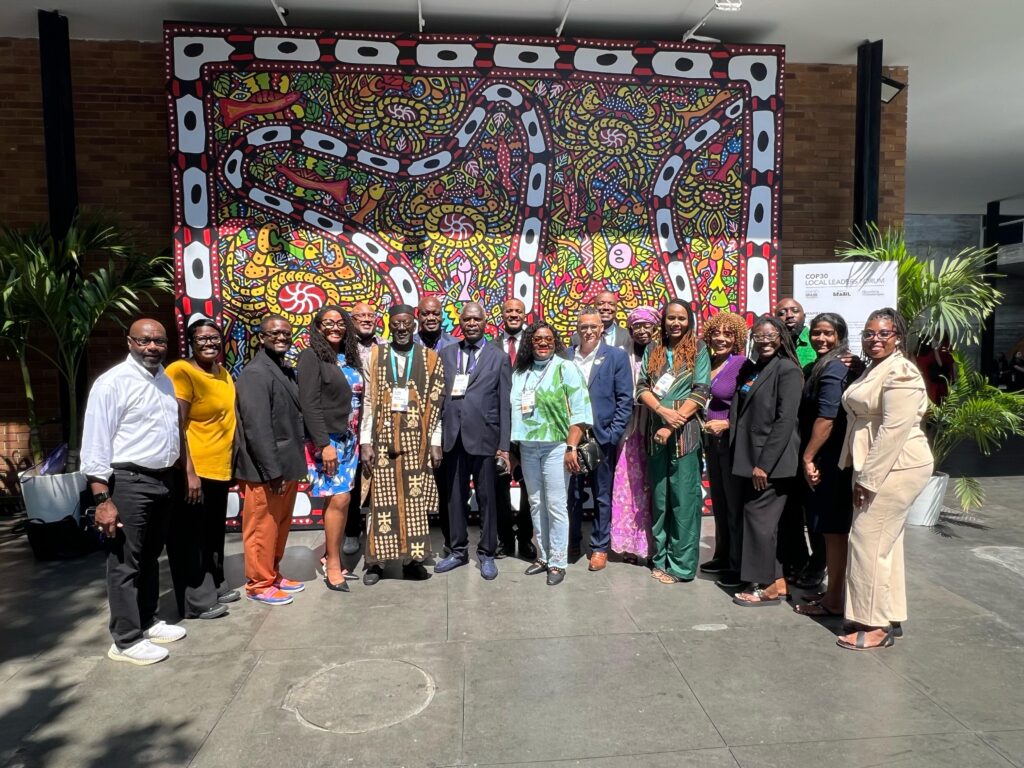
AAMA and ICLEI USA Mayors Bring Community-Rooted Climate Solutions to Rio
Last week, U.S. mayors joined peers from around the world in Rio de Janeiro for the C40 World Mayors Summit and the UN’s Global Climate Summit (COP30). This delegation included African American Mayors Association (AAMA) leaders, including a group participating in ICLEI USA’s Mayors Climate Action Training Program, who traveled together to exchange local experience and global insight.
Across conversations, site visits, and working sessions, these mayors showed how climate solutions grow from practical decisions and trusted community partnerships. Their work back home to strengthen water systems, improve air quality, expand nature-based resilience, and support local economies shaped the perspectives they brought to Rio.
Mayors Climate Action Training Program Participants
Mayor Brian K. Jackson of Beverly Hills, Missouri, elevated the value of regional collaboration. Through the 24:1 Municipal Partnership, he works alongside twenty-two neighboring municipalities to improve education, infrastructure, and quality of life. Beverly Hills is advancing climate action through the Cool Cities STL initiative, expanding tree canopy, increasing plant resilience, and building community engagement in sustainability.
Mayor Katrina Evans of Campti, Louisiana, has made reliable utilities a priority for her community’s future. Since taking office, she has led efforts to strengthen water systems, introduce renewable energy into city operations, and build long-term plans that protect residents and support local stability.
Mayor Derrick R. Wood of Dumfries, Virginia, brought lessons from a community in transition. Under his leadership, Dumfries closed its landfill ahead of schedule and converted the site into Overlook Park, a sixty-five-acre public green space. The town is also reconnecting residents to Quantico Creek through wetland restoration and nature-based amenities, demonstrating how environmental restoration and economic revitalization can go hand in hand.
Mayor Deana Holiday Ingraham of East Point, Georgia, highlighted a community taking charge of its energy and water future. East Point already provides ninety-four percent emissions-free electricity through its city-owned utility and is pursuing advanced energy storage to support a fully renewable power supply. The city is also installing Per- and polyfluoroalkyl substances (PFAS) filtration to protect drinking water, recognizing its responsibility not only to residents but also to businesses and consumers across the country who rely on East Point’s water.
Mayor Roderick D. Hampton of Haynesville, Louisiana, shared how his town is redefining rural sustainability through green space expansion, gray-water reuse, and ecosystem-based stormwater management. Haynesville’s annual Butterfly Festival transforms public gardens into pollinator habitats and outdoor classrooms, showing how environmental action and civic pride strengthen one another in small communities.
Mayor Ora Barnes Stevens of Marianna, Arkansas, represented her community with a focus on flood resilience and the importance of small-town leadership. Under her direction, Marianna is advancing a twenty-five-million-dollar Environmental Protection Agency project to reduce flooding and restore affected areas. Her perspective affirms that small communities, working collectively, form a vital foundation of national and global climate efforts.
Additional AAMA Mayors in Rio
Mayor Rex Richardson of Long Beach, California, shared the city’s leadership in decarbonizing one of the world’s busiest ports. Over the past year, Long Beach deployed more zero-emission charging infrastructure than any other U.S. port, advancing cleaner air for nearby neighborhoods and setting a global example for sustainable goods movement.
Mayor Shawyn Patterson-Howard of Mount Vernon, New York, described a major environmental restoration project transforming a former diesel tank farm into a clean maritime commerce hub. The initiative uses a closed-loop water system and zero-emissions operations, removing diesel truck traffic from residential streets while strengthening a greener shipping corridor along the Hudson River.
Mayor Derrick Rainey of Wrightsville, Arkansas, described ongoing efforts to strengthen flood management and improve neighborhood safety. Wrightsville secured more than five hundred thousand dollars for drainage upgrades, culvert improvements, and resiliency infrastructure. Through collaboration with AAMA and ICLEI USA, he is bringing new knowledge and practical tools back to his community to support continued growth and preparedness.
Transatlantic Connections for Shared Progress
During the COP30 Local Leaders Forum, AAMA mayors met with city leaders from across the ICLEI Africa network. These conversations reflected shared heritage, community responsibility, and a commitment to equitable climate action. Leaders explored opportunities to collaborate on renewable energy, resilient water systems, and sustainable economic development, opening pathways for continued partnership beyond Rio.
Carrying the Work Forward
These mayors traveled to Rio as voices for communities where climate work is not abstract. It happens in flood-prone neighborhoods, at small utilities modernizing their systems, and in public parks built where landfills once stood. They return home with new perspectives and partnerships, ready to put those insights to work for their residents. At its core, this effort is rooted in proximity. These leaders know their towns, know their people, and carry a responsibility that is personal as much as it is civic. Progress begins in places where families live and work, and their leadership shows how local action can shape a more resilient future for everyone.